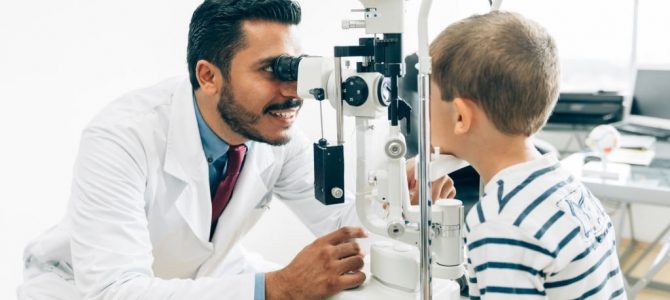Eye Facility in Andalusia: Premier Solutions for Vision Care
Eye Facility in Andalusia: Premier Solutions for Vision Care
Blog Article
Is Refractive Surgery Right for You? Aspects to Think About for Better Eyecare
In the realm of eye care, the decision to undertake refractive surgery is a significant one that requires thoughtful factor to consider. As people look for quality and freedom from the restrictions of rehabilitative lenses, numerous factors enter play when figuring out the viability of such a procedure. From the intricacies of one's ocular health to the complexities of day-to-day behaviors and individual expectations, each facet holds relevance in the wider landscape of refractive surgical procedure candidateship. By examining these vital aspects with care and accuracy, a more clear course in the direction of informed decision-making arises.
Eye Wellness Examination
When considering refractive surgical procedure, an extensive eye health and wellness assessment is important to analyze the suitability of the treatment for each and every individual. andalusia pediatrics. This assessment includes a collection of tests and evaluations conducted by an eye treatment professional to figure out the total wellness of the eyes, the presence of any underlying conditions, and the stability of the refractive mistake
Throughout the analysis, numerous factors are considered, such as the individual's case history, current eye prescription, corneal thickness, student size, and tear film quality. These analyses help to recognize any kind of contraindications to refractive surgery, such as corneal problems, cataracts, or untreated eye infections. Furthermore, the assessment assists to take care of individual expectations relating to the prospective end results of the surgical treatment based upon their one-of-a-kind eye features.
Inevitably, the eye wellness examination is essential in ensuring the security and efficiency of refractive surgical procedure, as it provides useful understandings into the individual's eye health condition and assists establish the most ideal treatment options for accomplishing optimum aesthetic outcomes. (eye doctors in andalusia)
Lifestyle Evaluation
An extensive lifestyle analysis is integral in figuring out the suitability of refractive surgical treatment for an individual's visual adjustment demands. Way of life aspects such as line of work, leisure activities, and everyday tasks play a vital function in the decision-making process relating to refractive surgical procedure. For circumstances, people with professions that involve a high degree of physical task or direct exposure to environmental elements may have various visual needs contrasted to those with less active desk jobs. Understanding exactly how a person's way of life may affect their vision post-surgery is vital for managing expectations and guaranteeing ideal results.
In addition, lifestyle routines such as sporting activities participation, outdoor activities, or also skin care regimens can influence the healing process and overall success of refractive surgical procedure. People who involve in contact sporting activities may require to take additional precautions to safeguard their eyes during the healing duration. In addition, individuals with considerable sun direct exposure might call for added post-operative care to prevent difficulties. By carrying out a comprehensive way of living assessment, eye treatment experts can customize their referrals and therapy plans to satisfy the one-of-a-kind needs of each patient, ultimately leading to boosted aesthetic results and contentment.
Assumption Placement

People need to comprehend that while numerous individuals attain 20/20 vision or far better following refractive surgery, some might still call for glasses for certain tasks like reading or driving at night. Handling these assumptions aids avoid frustration and discontentment post-surgery, leading to a more favorable overall experience for the individual.
Risk Analysis

Aspects that might boost the risk of problems consist of age, certain clinical problems like autoimmune illness, unsteady vision prescription, thin corneas, and impractical patient expectations. Additionally, selecting a experienced and seasoned surgeon, following pre and post-operative care instructions carefully, and disclosing any type of relevant case history can help mitigate risks.
To reduce the probability of difficulties, eye doctors conduct extensive pre-operative assessments to determine any kind of contraindications to surgical treatment. They also discuss the potential dangers and benefits with patients throughout the examination procedure. By participating in open interaction and shared decision-making, both the ophthalmologist and the individual can work together to identify if refractive surgical treatment is the best choice based upon specific risk accounts and preferred outcomes.
Appointment Value
Thinking about the essential role of informed decision-making in examining risks and prospective complications in refractive surgical procedure, the examination process holds substantial significance in leading people towards optimum outcomes. Throughout the assessment, the eye doctor assesses the client's eye health and wellness, refractive mistakes, and general suitability for surgical procedure. This first assessment is essential in establishing one of the most ideal treatment for every person, considering variables such as corneal density, pupil dimension, and existing eye problems.
Additionally, the consultation offers as a chance for clients to discuss their expectations, problems, and any inquiries they might have pertaining to the surgical procedure. Clear interaction in between the specialist and the patient is important to guarantee reasonable assumptions and an extensive understanding of the possible dangers and benefits involved.
Additionally, the appointment enables the doctor to discuss the various surgical options available, their particular outcomes, and the post-operative treatment needed. This comprehensive conversation empowers people to make knowledgeable decisions about their eye care, leading to better contentment and results post-surgery.
Conclusion
To conclude, individuals considering refractive surgical procedure needs to undergo a comprehensive eye wellness assessment, examine their lifestyle routines, go now straighten their expectations with prospective end results, examine the connected threats, and prioritize consultations with eye care professionals. These variables play an essential role in determining the suitability of refractive surgical treatment for each and every individual, making certain optimum end results and satisfaction with the treatment.
Clients thinking about refractive surgical treatment frequently have high assumptions regarding the end results, expecting perfect vision without the need for glasses or call lenses. While refractive surgery can greatly improve vision and minimize dependence on visual help, it is important for people to recognize that results might differ why not try this out based on individual variables such as the level of refractive error, corneal thickness, and overall eye wellness.
By involving in open communication and shared decision-making, both the eye doctor and the person can work together to identify if refractive surgical procedure is the appropriate selection based on individual danger accounts and preferred end results.
Thinking about the vital function of educated decision-making in analyzing dangers and potential complications in refractive surgical procedure, the appointment procedure holds considerable relevance in guiding people towards optimal results. During the assessment, the ophthalmologist assesses the individual's eye wellness, refractive errors, and total suitability for surgical procedure.
Report this page